
Satsvarupa dasa Goswami Maharaja
Spiritual Family CelebrationSaturday, July 5, 2025
What
Meeting of Disciples and friends of SDG
Where
The Veterans of Foreign Wars Hall
845 Hudson Avenue
Stuyvesant Falls, New York 12173There is plenty of parking near the Hall. The facility is just a few minutes’ walk from SDG’s home at 909 Albany Ave.
Schedule
10:00 – 10:30 A.M. Kirtana
10:30 – 11:15 A.M. Presentation by Satsvarupa Maharaja
11:15 – 12:30 P.M. Book Table
12:30 – 1:15 P.M. Arati and kirtana
1:15 — 2:15 P.M. Prasadam FeastContact
Baladeva Vidyabhusana at [email protected] or (518) 754-1108
Krsna dasi at [email protected] or (518) 822-7636SDG: “I request as many devotees as possible to attend so we can feel the family spirit strongly. I become very satisfied when we are all gathered together.”
******
Śrī Caitanya-caritāmṛta, Madhya-līlā 20.124–125: “O great learned devotee, although there are many faults in this material world, there is one good opportunity—the association with devotees. Such association brings about great happiness. . . . .”
Srila Prabhupāda: “Therefore, our Society is association. If we keep good association, then we don’t touch the darkness. What is the association? There is a song, sat-saṅga chāḍi’ kainu asate vilāsa, te-kāraṇe lāgila mora karma-bandha-phāṅsa (Gaurā Pahū, verse 3). Sat-saṅga. Sat-saṅga means association with the devotees. So the one poet, Vaiṣṇava poet, is regretting that, ‘I did not keep association with the devotees, and I wanted to enjoy life with the nondevotees. Therefore I’m being entangled in the fruitive activities.’ Karma bandha phāṅsa. Entanglement.” [Conversation with David Wynne, July 9, 1973, London]
If you would like to help, please contact Kṛṣṇa-bhajana dāsa at [email protected] or [email protected] and we will find you a service that utilizes your talents.
If it must be done, then obviously it needs to be done well. One of the ways to counteract offenses in chanting is to increase the vow beyond the bare minimum. It is also important to study the ten offenses as in authorized books like Hari-nama-cintamani, and to study oneself in order to extirpate the aparadhas. And practice, practice, practice fixing the mind with attention on each bead of the Hare Krsna mantra.
There is no conflict in principle between intensive japa meditation and the concentration needed to do outward preaching. They are parts of the one whole—a devotee should preach and behave well, like Srila Haridasa Thakura. Chant and hear, chant and preach.
******
Here comes Srila Prabhupada walking toward us on the part of the parikrama trail where it looks bare and devastated. He looks very gentlemanly, holding his cadar with one hand, the sannyasa robes flowing as he walks. Surprisingly, he is only with two “unimportant” devotees and a Western-dressed Indian man. He is walking in Vrndavana. It’s a distant shot. In this photo, everyone is chanting japa. Srila Prabhupada hardly went anywhere without his japa beads …
Prabhupada, we fulfill Rupa Gosvami’s upadesa for ideal chanting by following you. Rupa Gosvami says, “One should reside in Vraja and serve Krsna under the guidance of devotees.” One should follow in the footsteps of the Lord’s beloved devotees who are anuraga, rupanuga. If the eyes can only see a rubble-strewn Yamuna bank and deteriorating temple buildings, then those eyes do not see with inner vision.
******
Prabhupada, you did so many things I am not able to understand. You are not my pet that I should be able to see into you; you are jagad-guru who can expand into many svarupas, appear with many persons, and help conditioned souls by giving them your association. We see you walking and we bow down, touching all eight parts of our bodies on the sacred earth.
“Jaya!”
“Jaya Srila Prabhupada!”
“Now is your japa-yajna finished?”
“It will never be finished, Srila Prabhupada. I realize better that I will always chant Hare Krsna under your shelter. Please let me come with you or send me wherever you think I should go to help preach in your movement.”
“Very good. Chant Hare Krsna.”
Just a dream? But he actually came here. He is still here and he will be back.
******
In a rush at the end of day. Had my meeting. My last-try five rounds. Spacy. Thoughts on the mind not conducive to japa. I see myself coming out of a meditative period. It was a good time, desirable and introspective.
Waiting for evening milk. Already feeling frustrated. Some are frustrated by reading books like Hari-nama-cintamani and Manah-siksa, and by con-sidering, “Why can’t I attain nama-rasa?” Some are frustrated that they don’t make more money or don’t have a bigger house.
There are so many traps laid by maya, even for the sincere devotee. Raghunatha Gosvami has warned that the desire for fame is like a shameless prostitute whom we allow to dance in our hearts.
“I don’t want to be famous,” he said, as he finished his book on chanting.
******
Pray—I pray to you, dear mind and self, please pray in the morning like you didn’t do tonight, with tongue and mind in Vraja, recalling Krsna, Krsna, Krsna, Krsna—His name again and again.
******
Loading books and papers into the van, selecting a verse for tomorrow night’s Gita class.
Krsna, it’s You who are lovable and who we want to hear from, not from a lousy chanter in this world. You play with Balarama tossing balls and playing flutes. You play with Radhika in private caves at Govardhana, attended by the manjaris. You play by expanding Yourself into hundreds of Krsnas to be beside each gopi. Your day-long play ends when You come home at night with the dust from the cows’ hooves powdered on Your body. You are received and protected by Nanda and Yasoda. Please let me drink in these narrations. Please give me harer nama, the nectar drink for a starved and dry soul.
******
Here is a last statement by Srila Prabhupada encouraging us all to go on chanting (Bhag. 4.20.26):
Those who are not animals but actually intelligent, advanced, human, civilized men cannot give up this practice of continually chanting Hare Krsna Hare Krsna, Krsna Krsna Hare Hare/Hare Rama Hare Rama, Rama Rama Hare Hare.
pp. 27-30
I have a relationship with Lord Krsna. It’s demanding. It exhausts me sometimes. My relationship with Lord Krsna is my solace. I depend on Him. He’s always there. He wants to know about me as a friend. I am trying to learn how to be with Him at all times, how to distinguish myself from His Self. He is great and I am small.
His existence does not threaten mine. He is simply the Lord. Pure devotees never forget Him. The tendency may be to seek seclusion and exclude Krsna because He appears too demanding. Someone might say, “Give me only a distant relationship so I can be peaceful and know myself and tend to my own needs.” We become enamored by ourselves and our possibilities. We have neglected ourselves; the world has bounced us around. Now we want to heal. We want to walk on the beach and feel the pleasant breeze and be at peace.
Thus we may think that taking care of ourselves separates us from God consciousness. This can be taken to such an extreme that we think there is only one impersonal self, and that we don’t need to know God personally.
I don’t believe that. I want Lord Krsna to be present on my walk and in my thoughts. He and I and everyone and everything:
For one who sees Me everywhere and sees everything in Me, I am never lost, nor is he ever lost to Me (Bg. 6.30).
And:
By Me in My unmanifested form, this entire universe is pervaded. All beings are in Me, but I am not in them (Bg. 9.4).
Although I try to appreciate everything about Krsna, certain of His qualities are my favorites. Still, I want to learn everything about Him in order to increase my appreciation of our relationship. My best friend is also the controller of the material elements. He is the integrating power. He holds the universes together, and in one of His expansions, He destroys everything at the time of annihilation. I have heard that when I reach the highest stages in my relationship with Krsna, yogamaya will make me forget His greatness. But I’m not there yet. I need to hear whatever my spiritual master thinks is good for me.
One should not neglect to understand fully how great Krsna is, for by knowing the greatness of Krsna, one will be able to be fixed in sincere devotional service” (Bg. 10.7, purport).
Lord Siva praises Krsna’s expansion, Aniruddha. Srila Prabhupada writes,
Not only does Lord Aniruddha help fruitive actors by elevating them to the higher planetary systems, but He also helps the devotee engage in devotional service by dint of His inexhaustible energy. Just as heat is the source of material energy, the inspiration of Lord Aniruddha is the energy by which one can engage in executing devotional service (Bhag. 4.24.37, purport).
This is what I pray for during the day: physical strength and mental energy. O Lord Aniruddha, please give me strength to praise the Lord and seek my relationship with Him in a tangible way. I can’t do it without You.
“Even though one may desire to engage in the service of the Lord, without sanction one cannot do so.” (Bhag. 4.24.37, purport).
A relationship with Krsna means service to Him. I don’t think of myself as His equal. I don’t do Him a favor when I chant japa. I call out to be delivered from mega. Please give me the shelter of offenseless chanting. Please control my mind. Give me the strength to chant. You have already given the chanting to us, Lord, but I am so fallen I need to ask You to allow me to chant. I am already going through the motions, but why not let me enter the internal energy of hari-nama? This is my request for a relationship with the holy name.
pp. 177-80
I seem to want to just get through. Like right now I’m trying to write and publish books and I don’t want to be stopped. There’s an idea in the back of my mind that somehow I might be stopped. Criticism might stop me. But if I don’t get stopped, is that the success of my life? Nobody noticed me, I snuck through, I did things I wanted to do—published poetry books and this book and that book. The essence of these things is all right, but why the anxiety?
A materialist experiences this kind of anxiety in the extreme. He aspires to possess millions of dollars, so he makes it. So what? He meets a beautiful girl and has sex. So what? He eats and drinks. So what? How far can you go with that? Elvis Presley killed himself by taking so many over-the-counter drugs that his body just stopped functioning. I remember reading a newspaper article about it. It said he died of self-indulgence. What an idea! To die of self-indulgence! He just ate and ate and drank and drank and drugged and drugged himself and sang and tried to become famous and lost his fame and tried to get it back and got fat—and then he died at forty. But what was his life all about? It’s over and he’s gone, and he’ll never exist in that form again. He’s not in a position now to enjoy the fame he now has. People are worshiping him, but where is he? He’s not here to enjoy any of it. He’s not there in the Graceland museum, where his motorcycle sits behind a glass case. He’s not here to see the tears people shed when they look at that motorcycle. He’s probably living out in a doghouse in Chattanooga or Memphis. Who’s to say?
Life is passing by so quickly. My father used to say, “Stop to smell the flowers along the way. Take time to stop and smell the flowers.” That’s a little wisdom my father tried to live by. He tried to slow down. He was a hard-working karmi, but maybe somewhere along the line he also saw the uselessness of all the sweating and the straining.
I also remember the title of his book about the history of the New York Fire Department: As You Pass By. I don’t think my father pondered the meaning of that title exactly, but that book meant something to him. That book described how the fire department had evolved over the years from horse-drawn carts to big fire engines. I don’t know what the author’s intention was in naming his book, but it gave an idea of how all things must pass. Our “programs” inevitably be fulfilled.
Do you think they won’t? What if the star actor doesn’t appeal? Then the program has to change. You get to the theater only to find out that Hamlet is being played by John Smithers. Who the heck is John Smithers? You went there to see Richard Burton. So it appears that the program has changed, but it hasn’t, really. The real program is what your life means, not the details of what passes through it.
For myself, perhaps I think I’m being clever, sneaking through. I avoid this, I avoid that. No one called my name and made me stand and recite, I didn’t have to write the physics exam. I wasn’t the cat picked for special military dirty work. I wasn’t the one who had to run into the flaming building to save the kids. (Or maybe I was the one.) But what is really happening?
Okay, enough of that. Today is Lord Nrsimha’s Appearance Day and I think the tendency is when you have a busy schedule to not stop and smell the flowers, to not stop and actually worship Krsna. Worship is internal. Krsna is internal.
There are so many things on my mind that I don’t know which bullet to discharge first, so I’ll talk faster. I just wrote a book called My Relationship With Lord Krsna. One of the points I discussed was I was talking about myself instead of speaking straight krsna-katha.
Isn’t Krsna the center? I discussed that point in different ways. It felt good. You can read it if you want to know what I said.
Today I’ll tell pastimes about Lord Nrsimhadeva. We’ve all heard them a hundred times. Still, we can invest our speaking and hearing with a feeling. That’s what I mean about adding quality to your personal programming. Hiranyakasipu had a long-standing hatred of Lord Visnu, stemming at least from the time his brother was killed. Hiranyakasipu swore that he would kill Lord Visnu. That enmity was so strong that Hiranyakasipu went to the forest to perform severe austerities. We’ll tell the whole story.
Yesterday the mail arrived. I spent some time staring into the bundles it was divided into, trying to respond and satisfy people. I’m back to thinking more delicate thoughts, which I can’t do when I’m operating under the crush of too many things to do.
pp. 416-19
Read Tenth Canto. Hearing Krsna’s pastimes will relieve us from suffering. It solves any mental duality and diminishes any lingering doubts. Our natural affection for Prabhupada comes into focus. I feel confident that hearing from him will bring me to Krsna and does not need supplementation. The pastimes of other incarnations of the Lord are not as attractive to me as hearing about Krsna. Maharaja Pariksit praises Krsna’s childhood pastimes in Vrndavana. This time, reading as I rise at midnight will enable me to face the social demands of life in ISKCON.
When I give my Srimad-Bhagavatam lecture on Sunday (karmis don’t try to solve the problems of birth and death, etc., they don’t know there’s a spiritual world, sastra, Srila Prabhupada’s preaching), they will see through me. They will see my shortcomings, my isolation, my loneliness, and my foolish, superior attitude. Hurt, wounded by what has gone down, he takes an inward, arrogant air.
Yeah, bundled up family members stood through two mangala-aratis on the cold marble floors. “How are you? Good to see you. Are you going out (from Vrndavana) to preach sometimes?” I asked.
Yes, he says, in summer I go to Malaysia and America and Afghan Karunya. I feel inspired to preach.
Oh, see you later.
You should come to Vrndavana every year.
How’s your mom?
Bow down. Wealthy followers support him. Take your time, I know you get headaches and your disciples are here. Take your time.
“He takes such a strong stand, and you have to accommodate his reality.”
Things gathered. What’s their net worth?
At mangala-arati: A junior devotee put a straw mat on the cold marble floor for me to stand on. I deferred, so he promptly stood on it himself. I glanced over and saw Dhanurdhara Maharaja, who is barefoot, standing on one of those straw mats. As the mangala-arati kirtana progressed, I noticed the singer, who was playing mrdanga, was just inches from me on my left. The drum was loud, so I moved and stood on the other side.
Ingratiating smile, the manager looks in my direction and bows his head. I do the same. Or was he looking at somebody in front of me? I didn’t get a chance to go over and speak to Govinda Maharaja. His body looks big in the layers of clothes. Mangala-arati in the main temple. Stand at one altar, then move over. Jaya Krsna-Balarama, Jaya Krsna-Balarama, Jaya Krsna-Balarama.
How am I feeling toward those arca-vigrahas? I can’t say.
Vrnda, this jerk is your
maidservant? No, not yet.
Really, he said you’ve
really got to slow down. Tell
that rickshaw walla, “Nyet, nyet. Bas.”
No. Ouch! Pressure points hurt
loud pain is good for you—
“your organs are responding.”
Vrnda,
America, you grow there
too, O beloved of Krsna.
A couple of ISKCON sannyasis have paid for the construction of a big building near Krishna-Balaram Mandir. They have their building and compound walled in. On the outer wall someone has written, “Is this the way Prabhupada wanted his sannyasis to live?”
All day long I’ve been opting to do something other than writ¬ing. I guess it’s procrastination. Sometimes it seems like a duty. I’ve got a bunch of letters here, from both local devotees who are here in India and the usual letters forwarded from America. I answered letters instead of writing. Then I read and prepared my Bhagavatam class instead of writing. Then I ate and slept instead of writing. Then I chanted an extra round or two. Then I went to a meeting to preach about surrender—all instead of writing.
I told myself, “You don’t always have to write. Don’t force yourself.” And I said, “You’re not only a writer. You could start spending more time reading instead.”
So the pressure builds. I hope it will cause me to explode into irresistible writing full of realization.
Surrender to what happens, Lao Tze said, “Flow.”
Unless Krsna’s in the center . . .
Rasa dasa wrote me that his seventeen-year
old son was killed by a train.
Rasa wrote me that Litany brought
him back.
End the day in surrender.
Never forget you’re not a
special guru or Kafka
fan anymore, you’re a
cela,
Dee Dee Dee surrendered to Prabhupada.
Each one. I met an American devotee at
the entrance gate, said, “Hello, hello”
smile fading out
like on a film
fade-out—
we’re all vanishing . . . Bring us to the master’s feet before it’s too late surrendered in love.
pp. 20-24
It is a kind of blind hope to think this writing could lead to a state where I would have a higher taste. I just read about that higher taste in a purport to Srimad-Bhagavatam 10.1.4. The devotees are engaged in krsna-katha, and this writing is not that. Furthermore, the pure devotees are not interested in other topics:
“The spiritual master and the disciple do not need to understand anything more than Krsna simply be-cause by understanding Krsna and talking about Krsna one becomes a perfectly learned person.”
The devotees aren’t interested in material topics. Well, these aren’t materialistic topics.
I say if you are going to go on here (and that’s why we are residing in this remote place, to write. Oh, you could say let’s just drop the writing and only read. But that doesn’t seem to satisfy you. You want to talk of yourself, you want to write the sentence that comes.), then you better stop being disturbed by yourself and your limits. Out of this funk, on this windy, gray, misty, winter Irish day, I ask, “Would you like to sing and dance?”
Oh, he’s bringing in the wood in a
cardboard carton
and I’ve got my share.
I do burn that wood from midnight to breakfast and I’ve got my share.
Oh, I got my share and I do care
to improve but have to accept
the wind and rain and the water
gets cut off and
the sheep have to die
and a human is much better if
he knows of Krsna and Bhagavad-gita.
But he really ought to preach.
If I write a right book
that will serve in that way.
And I have my share.
You speak of your share.
You mean like demigods share in the yajna? No, I mean the Lord gives out as He likes, and whatever happens is your share. M. is axing the wood.
Dennis is coming slowly up the hill in his tractor (one headlight missing), and my lot is to type and not be irritated that I tell of the one theme of seeking to sing seeking to chant, seeking the writer, the writer’s cramp.
They got their theories and speculations, but Prabhupada says to stop it. It’s worse when they use Bhagavad-gita for that. Take it simple and as understood by Arjuna. Hear about the Lord in His many varied personal forms and energies. Just be there for your spiritual master. I pray for you, and I pray for others, but it would be especially nice if you could be satisfied. That means just accept who you are and when you have been given reciprocation from Krsna, then be satisfied because you are fully engaged.
Really, everything is as it should be. You don’t want to be a manager and preacher in the ordinary outgoing sense. So you have been allowed this privilege. You shouldn’t complain. You have what you want. As for not being able to write better, well, I see your point. You want to remain dissatisfied so you can improve. And you do have the objective sense to see the folly of your free-writing way. But you say this is your process and there’s no other way. Now if that is true, and it seems to be for now, then I say take it manfully and joyfully. Krsna is saying in effect (as best we can hear for now), “Go ahead, little man, write this way. I allow you, and in this way you can also find Me if you persist. But you have to try for a long time. And if you do, I can reveal Myself to you even through this writing process. And it is, possible I could use you as an instrument to serve others by reading books to help them on their way. But my little man, do you want to help others? Do you want to worship Me?” That’s the crucial question.
You mean it’s possible that this writing may be madly egotistical. Or at least tainted with that (which certainly was true before I met the Swami). Well, then it’s sad. But I propose to break out of that by talking to myself and by the writing process. The writing itself is not mad. It is what it is.
Make a prayer then. Dear Lord, please let me accept my lot and improve through the labors of writing. I wish to serve you and write Krsna consciousness in a natural way.
Okay, bring in some voice to help us speak.
pp. 13-19
A person engaged in such pure devotional service neither desires anything for sense gratification, nor laments for any loss, nor hates anything, nor enjoys anything on his personal account, nor becomes very enthusiastic in material activity.
According to Srila Rupa Gosvami, there are six impediments to the discharge of devotional service, and also six activities favorable to progress in devotional service.
The first impediment is atyahara, overeating or accumulating more wealth than we need. When we give free rein to the senses in an effort to enjoy to the highest degree, we become degraded. A devotee should therefore eat only enough to maintain his body and soul together; he should not allow his tongue unrestricted license to eat anything and everything it likes. The Bhagavad-gita and the great acaryas, or spiritual masters, have prescribed certain foods for human beings, and one who eats these foods eats in the mode of goodness. These foods include grains, fruits, vegetables, milk products, and sugar—and nothing more. A devotee does not eat: extravagantly; he simply eats what he offers to the Supreme Lord, Krsna. He is interested in krsna-prasadam (food offered to the Lord) and not in satisfying his tongue. Therefore he does not desire anything extraordinary to eat.
Similarly, a devotee does not wish to accumulate a large bank balance: he simply earns as much as he requires. This is called yuktahara. In the material world everyone is very active in earning more and more money and in increasing eating and sleeping and gratifying the senses; such is the mission of most people’s lives. But these activities should be absent from the life of a devotee.
The next impediment Srila Rupa Gosvami mentions is prayasa, endeavoring very hard for material things. A devotee should not be very enthusiastic about attaining any material goal. He should not be like persons who engage in fruitive activities, who work very hard day and night to attain material rewards. All such persons have some ambition—to become a very big businessman, to become a great industrialist, to become a great poet or philosopher. But they do not know that even if their ambition is fulfilled, the result is temporary. As soon as the body is finished, all material achievements are also finished. No one takes with him anything he has achieved materially in this world. The only thing he can carry with him is his asset of devotional service; that alone is never vanquished.
The next impediment to devotional service is prajalpa, talking of mundane subject matter. Many people unnecessarily talk of the daily happenings in the newspapers and pass the time without any profit. A devotee, however, does not indulge in unnecessary talks of politics or economics. Nor is a devotee very strict in following ritualistic rules and regulations mentioned in the Vedas. Becoming enamored of these rituals is the next impediment, called niyamagraha. Because a devotee fully engages in the supreme service of the Lord, he automatically fulfills all other obligations and doesn’t have to execute all the details of Vedic rituals. As the Srimad-Bhagavatam (11.5.41) says,
devarṣi-bhūtāpta-nṛṇāṁ pitṝṇāṁ
na kiṅkaro nāyam ṛṇī ca rājan
sarvātmanā yaḥ śaraṇaṁ śaraṇyaṁ
gato mukundaṁ parihṛtya kartam“Every human being born in this world is immediately indebted to the demigods, the great sages, ordinary living entities, the family, society, and so on. But a person who surrenders unto the lotus feet of the Lord and engages fully in His service is no longer indebted to anyone. In other words, he has no obligations to fulfill except executing devotional service.”
Finally, a devotee should not be greedy (laulyam), nor should he mix with ordinary materialistic men (jana-sanga).
These are six negatives, or “do-nots,” for the devotee; therefore one who wants to attain the perfectional stage of love of Godhead refrains from these things.
Similarly, there are six positive items for advancing in devotional service. First, while one should not be enthusiastic to attain material achievements, one should be very enthusiastic to attain the perfectional stage of devotional service. This enthusiasm is called utsaha. A living entity cannot stop acting. So when he is forbidden to become enthusiastic about material achievements, he should at once be encouraged to be enthusiastic about spiritual achievements. Enthusiasm is a symptom of the living entity; it cannot be stopped. It is just like a powerful engine: if you utilize it properly, it will give immense production. Therefore enthusiasm should be purified. Instead of employing enthusiasm for attaining material goals, one should be enthusiastic about achieving the perfectional stage of devotional service. Indeed, enthusing His devotees in devotional service is the purpose for which Krsna descends to this material world.
The next item favorable for devotional service is niscaya, confidence. When one becomes disappointed in his service to the Supreme Lord, that disappointment must be rejected and replaced with confidence in attaining the ultimate goal, love of Godhead. The devotee should patiently follow the rules and regulations of devotional service so that the day will come when he will achieve, all of a sudden, all the perfection of devotional service. He should not lament for any loss or any reverse in his advancement in spiritual life. This patience (dhairya) is the third positive item for advancing in devotional service.
Furthermore, a pure devotee is not envious, hateful, or lazy in the discharge of devotional service. Confident of his advancement, he continually performs his prescribed devotional duties. This is called tat-tat-karma-pravartane.
The last two items are sanga-tyaga, giving up the association of nondevotees, and sato-vrtti, following in the footsteps of the previous acaryas. These practices greatly help the devotee remain fixed on the path of devotional service and avoid the tendency to enjoy temporary, material things. Thus the activities of a devotee remain always pure and without any contamination of the material world.
pp. 174-76
Bombay ISKCON is preparing a 1993 calendar and asked me to “write in two or three lines a summary of Prabhupada’s achievements.” I could only boil a statement down to four sentences as follows:
“His Divine Grace A.C. Bhaktivedanta Swami Prabhupada did what no incarnation of Lord Visnu had ever done—spread sanatana-dharma, Krsna consciousness, all over the modern world. Lord Krsna Himself desired the spreading of the Hare Krsna mantra and so did Lord Caitanya (who is Krsna in the form of His pure devotee). They desired it, because unless people receive bhakti unto God, there cannot be peace or happiness in this life or in future lives. That our Srila Prabhupada was alone chosen to go to America, to Europe, then back to India, to Russia, Africa and all over the world—and that he established an international society whose followers continue to practice Krsna consciousness seriously—this is the greatest miracle, and it is proof that Prabhupada was empowered by Lord Krsna.”
Once Srila Prabhupada was asked for information for a short biography. He said a summary of his life should state that he transplanted Vedic culture from East to West. He said, “Just as it is very difficult and requires expertise in transplanting a tulasi plant from India to America, so the birth and growth of Krsna consciousness required such care.”
We may say this is the external achievement of his life. And it is true that the spiritual master has two lives, that of a sadhaka and that of a siddha. In his sadhaka form, he preaches, and that may be considered to exist within caitanya-lila. (ISKCON is a branch of the Caitanya tree.) In the siddha form, the pure devotee spiritual master remembers his eternal identity and eventually joins Krsna in the pravista, the pastimes of Radha and Krsna in Vraja.
Except for occasional glimpses, Srila Prabhupada didn’t reveal to us his siddha identity. But his role as preacher in this world was so extraordinary that learned persons conclude he was a saktyavesa-avatara. If we apply ourselves to serve Srila Prabhupada in his mission to spread and maintain some of its many fields of work—temple life, congregational preaching, book distribution, devotee education, gurukula, or any of the other activities that are part of this mission, that is the way to qualify ourselves for further understanding of Srila Prabhupada’s identity. That in turn will reveal to us who we are in our own spiritual identities.
The development of our own Krsna consciousness is an important service to Srila Prabhupada. That begins with sravanam-kirtanam visnoh smaranam. Chant Hare Krsna, read Srila Prabhupada’s books, chant with others—and always remember Krsna and devotional service. That will please Srila Prabhupada. Pleasing Srila Prabhupada is the goal of our lives.
******
Memorable moments in the drama:
JGd dasa’s portrayal of Mother Yasoda was good. He was dressed in a gold sari and gold nose jewelry. A skinny mother, worried “when is Krsna coming back?” Looking out at the rows in the audience from where Krsna would eventually appear. He was dressed like a woman, but walked like a boy. In the scene where the yajnic brahmanas tried to stop their wives from going to see Krsna, the brahmanas were all grouped on the left side of the stage and wives on the right. The brahmanas delivered speeches of reprimand, forbidding their wives. Then the ladies in unison said, “Hmpf!” and all ran off the stage while their husbands chased after them.
In several scenes, Krsna and His boyfriends sat and ate together. They were really eating, not just going through the motions. Madhumangala was played by a fat boy, and he gulped big bites from his banana and voraciously ate everything on his plate. The audience was fasting for Janmastami, so we enjoyed watching Krsna and His friends eating.
The boy who played Balarama was good-natured and at ease. He was a well-built boy, with belly bigger than his chest, a ready smile, a blue dhoti. Krsna was an Indian-American boy, beautiful and well-built. He shouted his lines with a Gujarati accent:
“My dear wives, rest assured that your husbands will not reject you on your return.”
Tiny boys dressed in turbans and colorful dhotis hung around on stage even when it didn’t seem to be their time to be there. They were the most convincing of all, artless gopas in krsna-lila, staring to see the fun and forgetting where they were.
Krsna’s several entrances from the audience to the stage were well done. He walked like a regal baby elephant and His friends with Him, just as we would expect. Radha’s entrance, as a devotee sang, “Jaya Radhe, jaya Radhe Radhe ” was joined by cheers and applause from the audience.
pp. 28-33
Bell
bird lands on branch night-
flying. Bzzz. A clack of
window blinds against wall
means death.
Lecturer said, “We talk of
thinking of Krsna at death
but don’t take it seriously.”
I thought, let’s
not keep talking of death, let’s
find an old jazz ballad like
“Ruby, My Dear” by T. Monk.
Let’s…
rhubarb pie
Let’s stye in the eye can ruin
your fun.
Death ain’t so bad if you
see it in the right perspective.
As O’Neill wrote wittily for
his gravestone, “There’s
something to be said
for being dead.”
Cripes where does it go?
The infinite spirit is also infinitesimal. The small part is us and should be dovetailed.
In service to the Supreme. The nature of islands and ice cream in gelateria. I better get more serious. Some make quips even up to death. But it’s no joke unless you consider it humorous to see yourself go and suffer running on a hot copper plain and thrust into airtight bag in the womb of the next mother. All stories you say? Hinduism? As you like it, go take a chance.
Sadaputa,
newcomers, I tell you
they will be able to conduct
this Krishna consciousness movement even
after I’m gone.
The old guy who wrote
Prabhupada’s biography
will shuffle off the stage
in his worn-down bed slippers.
Dig his jive,
his avid thirst for reading fanned
him with camara
while he fell asleep and
everyone took advantage
sinking his USS Sheffield
with a single meteor inside
that hit his brain.
Quick
what was you thinkin’ of
at the time of Death?
No teeth/pilot pen/business class/a last laugh/Kennedy Space Center, space suit. /Last conversations of Thérèse of Lisieux. One of her hands holds the other. She says, “I want to go to God and pray. I want Him to be happy, want to uh…Bless all souls to love Him as I do!” Such an ecstatic girl even in suffering. But Srila Prabhupada in Hyderabad said the Bible has only a little love of God, a little info. Some saints took it a long way.
When I turn the desk lamp on tiny
bugs shower from nowhere onto
pages, hand, desk top, desktop, more and more
like snow falling so you can turn the light
off.
Mayapur. Letters keep coming to my desk.
“I usually don’t tell you the details of my
life, but…” 12 pages, 7 pages, 10 pages…
Our parikrama is planned. I told Maharaja I
will have to come back early, can’t hack it
8, 10 hours a day as he’s planned.
He tells me he’s planning a film
on Prabhupada.
He’s also sorry how splinter groups take
advantage of ISKCON. I listen without
blinking but my mind goes now to the
new typewriter – Canon Typestar – a devotee
brought from America. I’m thinking
let me carry it like a “Deity” – no the
machine isn’t a divine murti but it’s my
holy bhajana for praising Gaura-Nitai,
holy name and the ravings.
Quotes the raving “nevermore”.
Keep on writing wherever you go and
carry it in your bulky bag.
Parikrama sounds great. My Godbrother
is from
Bengal and learned and loves the lilas. I’ll be
along to say, “Chant Hare Krsna,”
and Prabhupada “Prabhupada
said,” and adjust my ankle brace and
denture and
“head aids” and digestive aids and checking my
relaxation pulse in head and the scorpion
and tender feet.
I like that opening poem in Pictures from
Breughel by WCW. It’s a self-portrait
of Brueghel and ends with a 3-liner
“blond beard half-trimmed
no time for any-
thing but his painting.”
Poems like that in Krsna consciousness,
portraits of Vaishnavas, parikramas, with
that observing eye and clean elegant lines
divided at the right point by a poet
who knows what he’s doing. Wouldn’t
it be nice?
* * * * *
Life in this room, rapid fan. Small bags. Sound of kirtana from the temple, Damodarastakam. I don’t dare go down. When I stand in the temple some young Indian devotee, out of formal respect for me, will start pushing away anyone who is standing in front of me. They clear a whole path, five people deep, so no one stands between me and the Deity. Then people start looking at me, the special person they are being asked to step aside for. No use asking the young devotee not to do it because if he doesn’t, someone else will. That’s how they are trained.
You fall for it
think yourself special
and you’ll come back next life
to take a position of power.
Fall for it and become a bug
next time. Be a word
pusher…a poet, a bug
I said
a movie producer,
a king, a politician, in any
material form it’s suffering.
When are you gonna wake
up and start chanting?
The fan, the fan…
Disciples to the left and right.
******
My master carries me across. Be kind to others. Tell them, “Here is your sandwich on monk’s bread made in New York State. Taste how firm it is. With Skippy’s crunchy peanut butter and some good jam or strawberry jelly.” You okay? Are you okay or what’s wrong?
Cross-eyed I’m not. Right now Okay in head. But you don’t know me!
You don’t care to know me
I don’t care to tell you
and neither can I express – It’s
like Viraha? Maybe – some symptoms of ennui
express (NYC Greenwich Village espresso café)
Wrought and sport and splayed out Village Voice
Jackie McClean on alto sax at Living Theater with
Freddie Read.
Them were the days,
John Young smoking cigarettes which I never did, clouding up my room and beer unto at end of night I had to turn on the Vornado fan to high exhaust and get it all out before I could sleep
sick and sad
but happy energy of youth to be able to hear Miles Davis in the morning. I am making this up. I had little time, rose at 6 A.M. (mother too, off to Manhattan, her job at Chase Manhattan) and study and travel to Brooklyn College, you doing okay…
Cope, Cope, COPE
I’m not the same person – yet am I not? So, now…A Big Spiritual Master. If this is true of me that I say crap I say it may be true of you. Would like to go from head to heart
in and chant holy names.
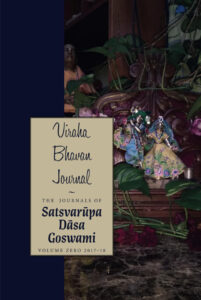
Viraha Bhavan Journal (2017–2018) was written by Satsvarūpa Mahārāja following a brief hiatus in writing activity, and was originally intended to be volume 1 in a series of published journals. However, following its completion and publication, Mahārāja again stopped writing books, subsequently focusing only on what became his current online journal, which began in August of 2018.
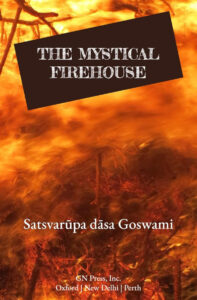
At first, I took it hard that I would have to live surrounded by the firemen, and without my own solitude. After all, for decades I had lived in my own house with my own books and my own friends. I was also now a crippled person who couldn’t walk, living among men who did active duties. But when Baladeva explained it to me, how it was not so bad living continually with other firemen and living in the firehouse with its limited facilities, I came to partially accept it and to accept the other men. I came to accept my new situation. I would live continually in the firehouse and mostly not go outside. I would not lead such a solitary life but associate with the other firemen.
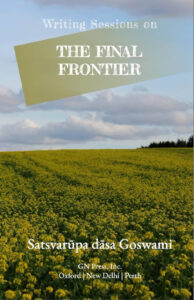
Let me write sweet prose.
Let me write not for my own benefit
but for the pleasure of Their Lordships.
Let me please Kṛṣṇa,
that’s my only wish.
May Kṛṣṇa be pleased with me,
that’s my only hope and desire.
May Kṛṣṇa give me His blessings:
Kṛṣṇa Kṛṣṇa Kṛṣṇa Kṛṣṇa Kṛṣṇa he
Rāma Rāghava Rāma Rāghava
Rāma Rāghava rakṣa mām.
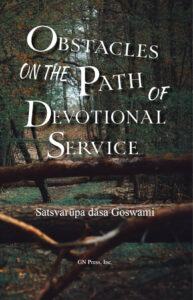
You mentioned that your pathway has become filled with stumbling blocks, but there are no stumbling blocks. I can kick out all those stumbling blocks immediately, provided you accept my guidance. With one stroke of my kick, I can kick out all stumbling blocks. —Letter by Śrīla Prabhupāda, December 9, 1972.
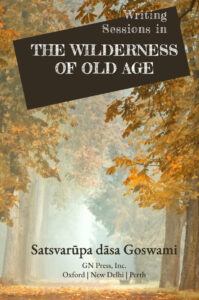
The Writing Sessions are my heart and soul. I’m trying my best to keep up with them. I am working with a few devotees, and they are far ahead of me. I wander in the wilderness of old age. I make my Writing Sessions as best I can. Every day I try to come up with a new subject. Today I am thinking of my parents. But I don’t think of them deeply. They are long gone from my life. Śrīla Prabhupāda wrote a poem when he was a sannyāsī, and he said now all my friends and relatives are gone. They are just a list of names now. I am like that too. I am a sannyāsī with a few friends. I love the books of Śrīla Prabhupāda. I try to keep up with them. I read as much as I can and then listen to his bhajanas.
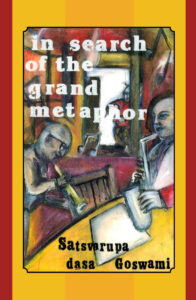
The metaphor is song. Explain it. Yes, particulars may not seem interesting or profound to readers who want structured books.
Wait a minute. Don’t pander to readers or concepts of Art. But Kṛṣṇa conscious criteria are important and must be followed. So, if your little splayed-out life-thoughts are all Kṛṣṇa conscious, then it’s no problem.
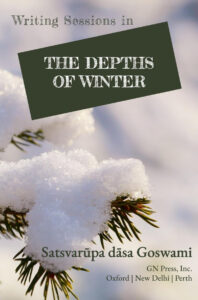
I am near the end of my days. But I do like the company of like-minded souls, especially those who are Kṛṣṇa conscious. Yes! I am prone to Kṛṣṇa consciousness. I have been a disciple of Bhaktivedanta Swami Prabhupāda for maybe almost sixty years. Sometimes I fail him. But I always bounce back and fall at his feet. It is a terrible thing that I sometimes do not have the highest love for him. It is a terrible thing. Actually, however, I never fall away from him. He always comes and catches me and brings me back to his loving arms.

This edition of Satsvarūpa dāsa Goswami’s 1996 timed book, Upstate: Room to Write, is published as part of a legacy project to restore Satsvarūpa Mahārāja’s writings to ‘in print’ status and make them globally available for current and future readers.
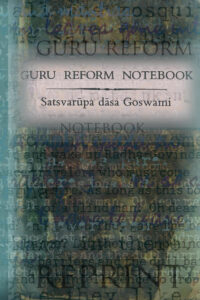
A factual record of the reform and change in ISKCON guru system of mid ’80s.

Readers will find, in the Appendix of this book, scans of a cover letter written by Satsvarūpa Mahārāja to the GN Press typist at the time, along with some of the original handwritten pages of June Bug. Together, these help to illustrate the process used by Mahārāja when writing his books during this period. These were timed books, in the sense that a distinct time period was allotted for the writing, during SDG’s travels as a visiting sannyāsī
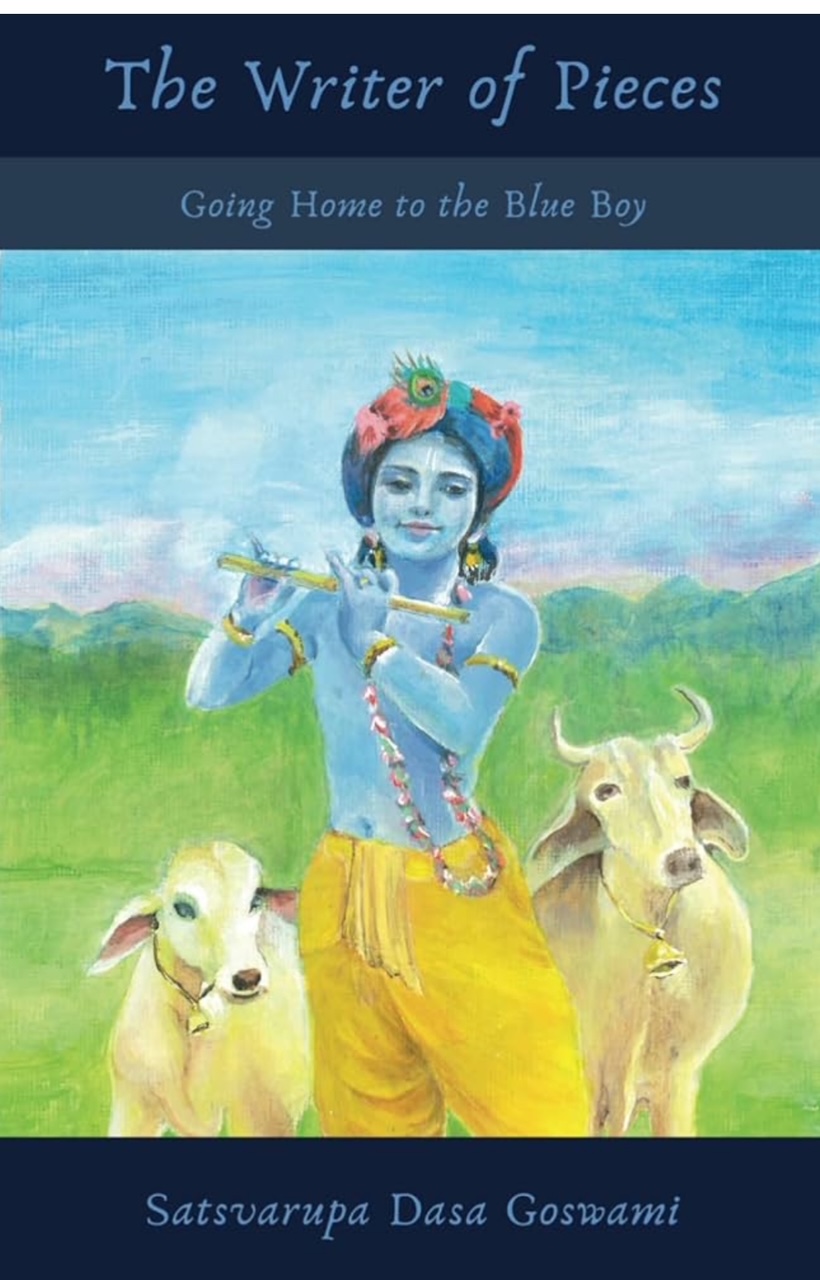
Don’t take my pieces away from me. I need them dearly. My pieces are my prayers to Kṛṣṇa. He wants me to have them, this is my way to love Him. Never take my pieces away.
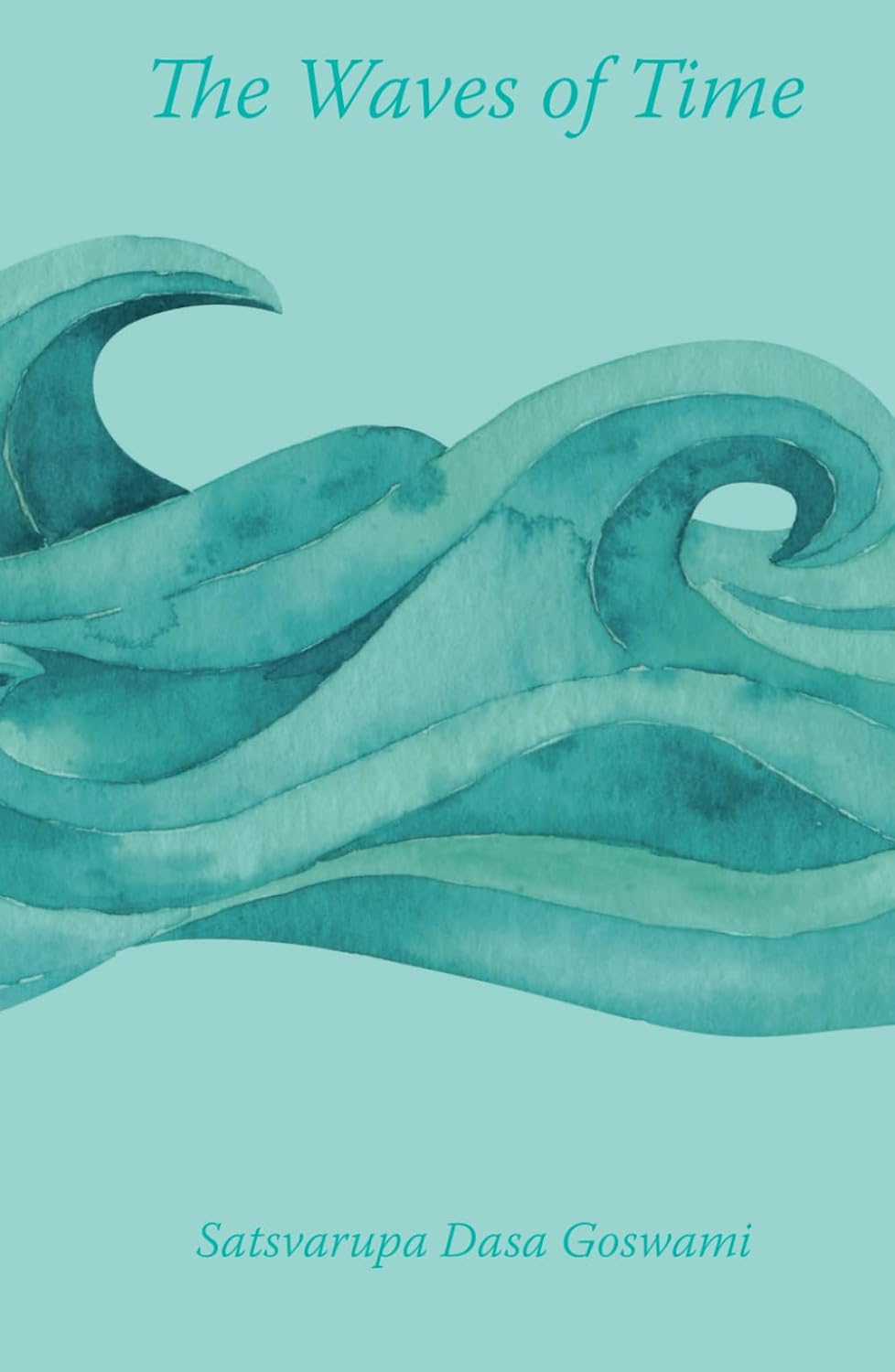
Many planks and sticks, unable to stay together, are carried away by the force of a river’s waves. Similarly, although we are intimately related with friends and family members, we are unable to stay together because of our varied past deeds and the waves of time.

To Śrīla Prabhupāda, who encouraged his devotees (including me) To write articles and books about Kṛṣṇa Consciousness.
I wrote him personally and asked if it was alright for his disciples to write books, Since he, our spiritual master, was already doing that. He wrote back and said that it was certainly alright For us to produce books.

I have a personal story to tell. It is a about a time (January–July 1974) I spent as a personal servant and secretary of my spiritual master, His Divine Grace A.C. Bhaktivedanta Swami Prabhupäda, founder-äcärya of the International Society for Krishna Consciousness. Although I have written extensively about Çréla Prabhupäda, I’ve hesitated to give this account, for fear it would expose me as a poor disciple. But now I’m going ahead, confident that the truth will purify both my readers and myself.

First published by The Gītā-nāgarī Press/GN Press in serialized form in the magazine Among Friends between 1996 and 2001, Best Use of a Bad Bargain is collected here for the first time in this new edition. This volume also contains essays written by Satsvarūpa dāsa Goswami for the occasional periodical, Hope This Meets You in Good Health, between 1994 and 2002, published by the ISKCON Health and Welfare Ministry.

This book has two purposes: to arouse our transcendental feelings of separation from a great personality, Śrīla Prabhupāda, and to encourage all sincere seekers of the Absolute Truth to go forward like an army under the banner of His Divine Grace A.C. Bhaktivedanta Swami Prabhupāda and the Kṛṣṇa consciousness movement.

A single volume collection of the Nimai novels.

Śrīla Prabhupāda was in the disciplic succession from the Brahmā-Mādhva-Gauḍīya sampradāya, the Vaiṣṇavas who advocate pure devotion to God and who understand Kṛṣṇa as the Supreme Personality of Godhead. He always described himself as simply a messenger who carried the paramparā teachings of his spiritual master and Lord Kṛṣṇa.

Dear Srila Prabhupada,
Please accept this or it’s worse than useless.
You have given me spiritual life
and so my time is yours.
You want me to be happy in Krishna consciousness
You want me to spread Krishna consciousness,

This collection of Satsvarūpa dāsa Goswami’s writings is comprised of essays that were originally published in Back to Godhead magazine between 1966 and 1978, and compiled in 1979 by Gita Nagari Press as the volume A Handbook for Kṛṣṇa Consciousness.

This second volume of Satsvarūpa dāsa Goswami’s Back to Godhead essays encompasses the last 11 years of his 20-year tenure as Editor-in-Chief of Back to Godhead magazine. The essays in this book consist mostly of SDG’s ‘Notes from the Editor’ column, which was typically featured towards the end of each issue starting in 1978 and running until Mahārāja retired from his duties as editor in 1989.

This collection of Satsvarupa dasa Goswami’s writings is comprised of essays that were originally published in Back to Godhead magazine between 1991 and 2002, picking up where Volume 2 leaves off. The volume is supplemented by essays about devotional service from issues of Satsvarupa dasa Goswami’s magazine, Among Friends, published in the 1990s.

“This is a different kind of book, written in my old age, observing Kṛṣṇa consciousness and assessing myself. I believe it fits under the category of ‘Literature in pursuance of the Vedic version.’ It is autobiography, from a Western-raised man, who has been transformed into a devotee of Kṛṣṇa by Śrīla Prabhupāda.”
 The Best I Could Do
The Best I Could DoI want to study this evolution of my art, my writing. I want to see what changed from the book In Search of the Grand Metaphor to the next book, The Last Days of the Year.
 a Hare Krishna Man
a Hare Krishna ManIt’s world enlightenment day
And devotees are giving out books
By milk of kindness, read one page
And your life can become perfect.
 Calling Out to Srila Prabhupada: Poems and Prayers
Calling Out to Srila Prabhupada: Poems and PrayersO Prabhupāda, whose purports are wonderfully clear, having been gathered from what was taught by the previous ācāryas and made all new; O Prabhupāda, who is always sober to expose the material illusion and blissful in knowledge of Kṛṣṇa, may we carefully read your Bhaktivedanta purports.

I use free-writing in my devotional service as part of my sādhana. It is a way for me to enter those realms of myself where only honesty matters; free-writing enables me to reach deeper levels of realization by my repeated attempt to “tell the truth quickly.” Free-writing takes me past polished prose. It takes me past literary effect. It takes me past the need to present something and allows me to just get down and say it. From the viewpoint of a writer, this dropping of all pretense is desirable.
 Geaglum Free Write
Geaglum Free WriteThis edition of Satsvarūpa dāsa Goswami’s 1996 timed book, Geaglum Free Write Diary, is published as part of a legacy project to restore Satsvarūpa Mahārāja’s writings to ‘in print’ status and make them globally available for current and future readers.